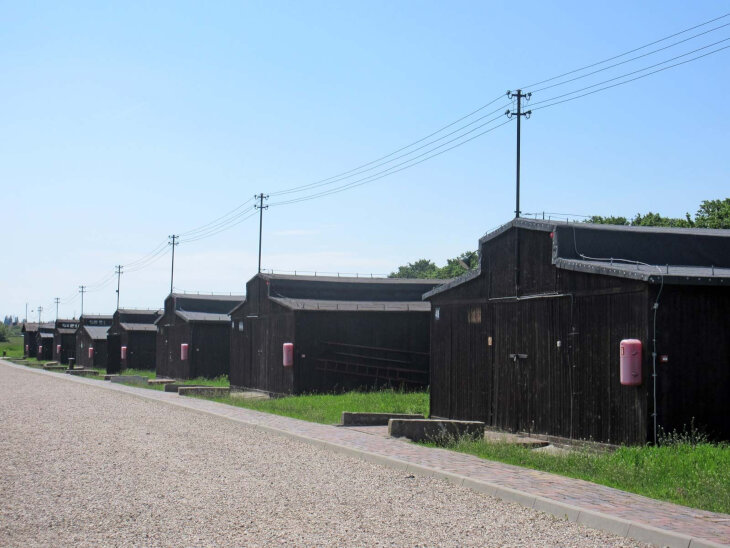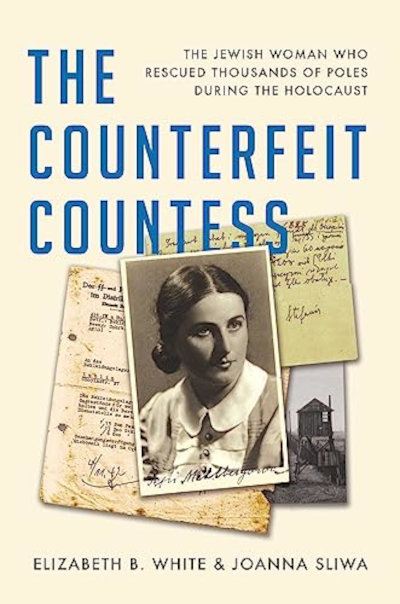 Iran’s Attack on Israel
Iran’s Attack on Israel


8 min read
Dr. Josephine Janina Mehlberg took on the fraudulent title of “countess” to rescue thousands from the death grip of the S.S.
On September 1, 1939, Hitler invaded Poland. The Polish people tried to defend themselves, but within only three weeks, the Nazis had successfully taken over.
They started systematically killing thousands of Jewish and non-Jewish Poles. The Nazis put some of the Jews in ghettos – including the Warsaw ghetto, which housed half a million Jews – and sent others, along with non-Jewish Poles, to concentration camps. Hitler believed that both populations were inferior to the German people, and he sought to eradicate them.
But in the face of evil, some brave souls stood up and fought for what was right. One of these people was Dr. Josephine Janina Mehlberg, who took on a new identity and saved 10,000 people from the Nazis.
Dr. Josephine Janina Mehlberg was born into a Jewish family on May 1, 1915 in Galicia, Poland. Galicia had a large Jewish community; by 1910, there were 872,000 Jews, and they made up 10.9% of the total population of the region.
Josephine, who went by the name Janina Mehlberg, received a doctorate in 1938. She married a fellow student at the university and settled in Lwow, which was later change to Lvov, and became an accomplished mathematician.
When the Nazis invaded Poland, Janina and her husband had to think quickly. After they miraculously evaded several death camp roundups, they escaped to Lublin, where their family friend, Count Andrzej Skrzynski, bestowed new identities upon them: Count and Countess Suchodolska. With forged paperwork, they became Catholic aristocrats.
Even with their false identities, the “count” and “countess” couldn’t avoid the Nazis for long. The German SS soon took over Lublin, and Skrzynski recruited Janina to provide welfare services like food and medicine to those who were imprisoned at the Majdanek concentration camp, established in October of 1941. It was the headquarters of Aktion Reinhard, the SS operation that murdered over 1.7 million.
Jewish forced laborers helped to construct Majdanek, and in December of 1941, the Nazis rounded up more than 300 Jews in the streets of Lublin. Then, 150 of them were sent to the camp, where they became the first Jewish prisoners there. All in all, at least 63,000 Jews were murdered in Majdanek’s shooting pits and gas chambers.
 Majdanek concentration camp
Majdanek concentration camp
While at the Majdanek concentration camp, Janina joined the underground Polish resistance against the Nazis and became an officer. It was there that she witnessed the horrors of the Holocaust, including “the smell of burnt hair and roasting flesh.”
At Majdanek, she repeatedly pushed the SS for permission to offer ever larger quantities of food for Poles imprisoned there, until she was finally able to deliver soup and bread five days a week for thousands of prisoners; she added 1,200 calories to their daily diet. She usually brought the deliveries herself inside the camp, and then utilized them as cover to smuggle in messages and supplies to the Polish resistance members who were imprisoned there.
She also helped prisoners during a typhus epidemic and skillfully negotiated with SS officials for the release of more than 10,000 prisoners who were facing death.

Though Janina was a talented mathematician, she didn’t calculate the risk involved in saving people – she went ahead and did it, living to tell her story in her memoir and emigrating to the U.S., where she lived out the rest of her life peacefully. However, not many people had heard of her.
Now, authors Elizabeth B. White and Joanna Silwa have changed that, capturing the fascinating life story of Janina Mehlberg in their new book, “The Counterfeit Countess.”
Elizabeth first learned about Janina’s story in 1989. After she delivered a conference paper on the Majdanek concentration camp, an historian she didn’t know give her the unpublished memoir of Janina Mehlberg, a Jewish woman who said she aided prisoners at Majdanek while pretending to be the Polish Countess Suchodolska.
“Mehlberg had died 20 years earlier in Chicago, where she had been a tenured full professor of mathematics at the Illinois Institute of Technology, and the historian had received the memoir from Mehlberg’s husband shortly before his death a decade later,” Elizabeth said. “The historian hoped that I would find a way to publish the memoir.”
The memoir’s claims astonished Elizabeth who had never heard of Mehlberg.
“Was it really possible that a petite Jewish woman negotiated with some of the same officials involved in this mass murder?” she said. “Could she really have dared to repeatedly enter a place where she knew Jews were being murdered and to smuggle supplies to the resistance under the very noses of the SS there?”
Decades passed and Elizabeth wasn’t able to confirm Mehlberg’s story – the historian she originally connected with had died, and she wasn’t sure what to do. Still, the story haunted her. So a few years ago, she sent Mehlberg’s memoir to Joanna Silwa, whom she knew was an expert on the Holocaust in Poland.
“After reading it, she offered to partner with me in the effort to verify the memoir,” Elizabeth said.
What the two authors discovered what that Mehlberg led a remarkable life as a mathematician before and after the war, and what she did during the war deserved to be told. They worked to make the book available and share the story with the world. Now, in the wake of October 7, it’s especially prevalent.
“We have seen a frightening rise in antisemitism around the world,” Joanna said. “Accompanying it is another concerning phenomenon – Holocaust distortion, which, among other things, aims to make antisemitism acceptable.”
The book dispels Holocaust denial, which has become more and more widespread, especially on social media.
 Authors Elizabeth B. White and Joanna Silwa
Authors Elizabeth B. White and Joanna Silwa
“The story of Janina Mehlberg told in our book shows how unfounded antisemites’ ideas about Jews are,” Joanna said. “Mehlberg was a committed Polish patriot who, while undercover, worked with an array of individuals of various ideological stripes to achieve her goals and the goals of the Polish resistance and Poland’s Government-in-Exile. As this book is about the Holocaust and one woman’s survival strategy, the book lays bare the dangers of antisemitic language and images that resulted in a racist ideology, leading to the systematic persecution and murder of millions of Jews.”
While things may seem bleak due to the rise in antisemitism and the war in Israel, Janina’s story gives readers hope and inspires them to be brave, always standing up for what’s right.
It was not lack of fear but rather obstinate determination that enabled her to negotiate successfully with the Germans.
“One lesson is that one person can make a difference, and especially when acting in the context of a network,” said Joanna. “Janina made decisions independently to engage in highly visible and dangerous work, but she could not have done what she did without the support and involvement of an entire group, composed mainly of other women. These were Polish women who devised methods to smuggle food and medicine to prisoners and to establish lines of communication. They prepared food, fundraised, procured medical items, traveled as couriers, conducted rescue operations, and more.”
Janina also didn’t discriminate when it came to helping people. She wanted to spread goodness and love and aid to whomever she could.
“Janina believed in justice, that people should be held accountable for their actions, but for herself, she decided not to judge others, realizing that none of us is completely defined by either the best or the worst that we do,” Elizabeth said. “She wrote that she was just one person in ‘the vast suffering human family,’ and she viewed all other humans as members of that family. If they were suffering, then she wanted to help them; if they were despairing, then she sought to give them hope.”
While superheroes don’t exist, like Janina, we all have the ability to do what is just and make a difference in the world. That’s the profound lesson readers can learn from “The Counterfeit Countess.”
“Janina admitted that she was not fearless, which I think makes what she did so much more heroic,” said Elizabeth. “It was not lack of fear but rather obstinate determination that enabled her to negotiate successfully with the Germans. She did not take ‘no’ as a final answer but simply looked for ways to get a different answer, often by going over the heads of the officials who refused her. She had a knack for framing her requests as common-sense measures that were in the Germans’ interest. And when she was told ‘yes,’ she considered it an invitation to ask for more.”

Another heroine is Helène Moszkiewiez. She worked as secretary in the headquarters of the Gestapo in the Belgian capital Brussel, spying for the British intelligence. She was a blond Jew. https://en.m.wikipedia.org/wiki/Helene_Moszkiewiez
Helene Moszkiewiez worked in the Gestapo headquaters in the capital Brussel (Belgium) as a secretary, spying on the Nazis. There are a number of heroines. She is one of them. https://en.m.wikipedia.org/wiki/Helene_Moszkiewiez
Thanks
What a brave, brilliant, resourceful woman, carrying the soul of the divine within her... I will certa8nly get this book.
Thank you for sharing this story. This woman was certainly a surprise and I'm anxious to read the book.
Can’t wait to read the book!
Thank you for sharing the story of this true heroine.